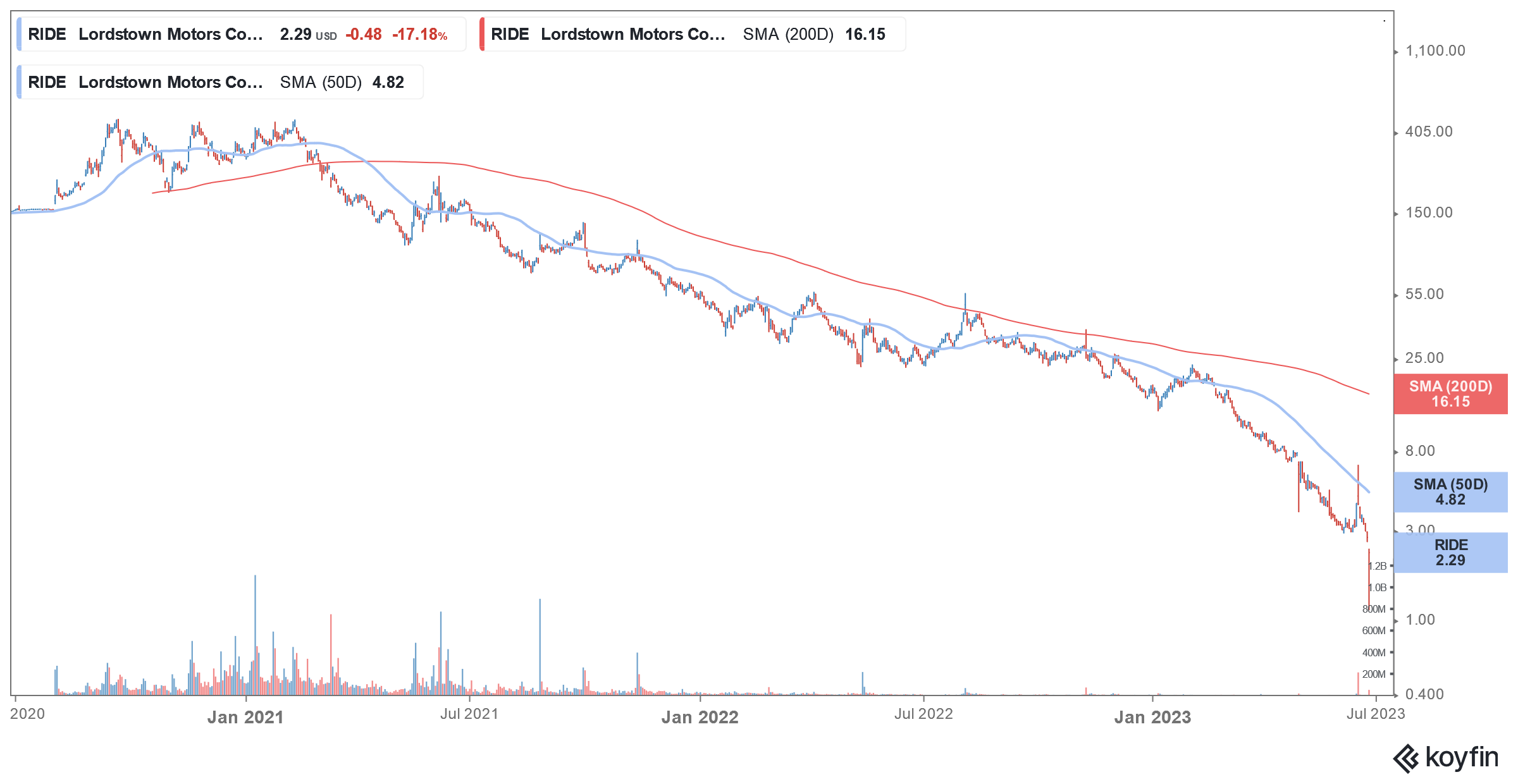Lordstown Motors Files for Bankruptcy and Sues Foxconn: Key Takeaways
Please note that we are not authorised to provide any investment advice. The content on this page is for information purposes only.
Lordstown Motors (NYSE: RIDE) has announced a “strategic restructuring process” and has filed for bankruptcy while suing its production partner Foxconn over the stalled funding deal. Here are the key takeaways.
Lordstown said that the restructuring is intended to “maximize the value of its assets” which include the “on-the-road Endurance all-electric (EV) pickup truck and the intellectual property, platform and people that developed it.”
Lordstown Motors sues Foxconn
It is also suing Foxconn and said “The litigation details Foxconn’s fraud and willful and consistent failure to live up to its commercial and financial commitments to the Company. Foxconn’s actions led to material damage to the Company as well as its future prospects.”
Notably, in 2021, Lordstown Motors sold its Lordstown plant to Foxconn for $230 million. The company bought the plant from its original owner General Motors for $20 million and the transaction was once hailed as a revival of manufacturing in the US.
Then US President Donald Trump also inspected the Endurance on the White House lawn. Trump praised the model and said, “This is a really unique thing because the four wheels are — hub motor, hub motor — this is the only one that does this in the world. It has a lot of advantages.”
RIDE ran into multiple troubles
Lordstown Motors went public through a SPAC (special purpose acquisition company) merger which has been the preferred listing model for companies in the green economy. The stock has been sliding for almost three years now – led by both weak macros as well as company-specific factors.
The company’s woes began in 2021 when Hindenburg Research accused it of inflating its order book and overhyping its manufacturing capabilities.
The company set up a committee to review the allegations. After the review, the company’s CEO Steve Burns and CFO Julio Rodriguez resigned as the committee found some allegations – especially related to the order book as true.
Lordstown Motors faced production issues
Meanwhile, like most fellow startup EV companies, Lordstown Motors also battled production and cash burn issues. It produced only a handful of trucks last year and also had to do a recall.
The company’s production is running way behind the original schedule. When it went public in 2020, it forecast production of 31,600 for 2022 but couldn’t even produce 100 vehicles in the year.
It forecast a production of 65,000 for 2023 but is struggling to produce even a few hundred vehicles.
To be sure, other EV startups also face a similar issue. Lucid Motors for instance expects to produce over 10,000 cars in 2023 as compared to the original guidance of 49,000. Other EV startups like Arrival and Nikola are also running way behind the production timelines that they unveiled during the SPAC mergers.
RIDE sold the Lordstown plant to Foxconn
RIDE sold the Lordstown plant to Foxconn amid production hiccups and the latter now makes cars under contract manufacturing. Last year, Foxconn also announced a $170 equity investment in RIDE. It invested $52.7 million in Lordstown last year and another $47.3 million was supposed to come after the regulatory approval.
While the two companies obtained the regulatory approval in April, Foxconn walked out from the deal citing the crash in RIDE stock post which its stock price went below $1 – which it said was a breach of the covenant.
Lordstown Motors went for a reverse stock split which helped catapult its stock price above $1. However, Foxconn did not relent and the funding deal did not materialize.
Foxconn warned that it might go bankrupt if Foxconn does not honor the funding deal – and that’s what precisely has happened.
RIDE files for bankruptcy
In its complaint against Foxconn, RIDE said, “After getting the valuable assets it desired upfront, it then sabotaged the Debtors’ business, starving it of cash and causing it to fail. Instead of building a thriving business for the benefit of all Lordstown’s stakeholders, Foxconn maliciously and in bad faith destroyed that business, costing Lordstown’s creditors and shareholders billions.”
EV companies are struggling with massive cash burn
Notably, startup EV companies are struggling with massive cash burn and need a continuous supply of fresh funds to keep their operations functioning. Raising money wasn’t much difficult between 2020 and 2021 as investors bought into the EV growth story – pouring billions of dollars into finding the “next Tesla.”
At its peak, Lordstown Motors had a market cap of around $5 billion which has now fallen to a mere $37 million.
Other EV companies are also on a capital-raising spree and last month, Lucid Motors completed a $3 billion stock sale which was preceded by a $1.5 billion stock sale late last year also.
Rivian also raised $1.3 billion through a convertible issue earlier this year. Arrival has also raised capital in order to fund its operations. It eventually opted for a second SPAC merger to raise more funds.
Nikola is also looking to raise more cash
Nikola has also raised cash multiple times since the merger and is seeking shareholder approval to increase its share count further which would help it sell more shares.
When Nikola went public in 2020, it was among the first EV SPACs. At its peak in 2020, the company’s market cap was in excess of $30 billion and it surpassed Ford’s then valuation.
It was among the early signs of an impending bubble in EV stocks. However, thanks to the Fed’s accommodative monetary policies and scores of SPACs hunting for EV targets, the bubble continued to build and only got bigger by the end of 2021.
The SPAC bubble has since burst and many de-SPACs or the companies that went public through SPAC reverse mergers are now fighting for survival – as is the case with Lordstown Motors.






